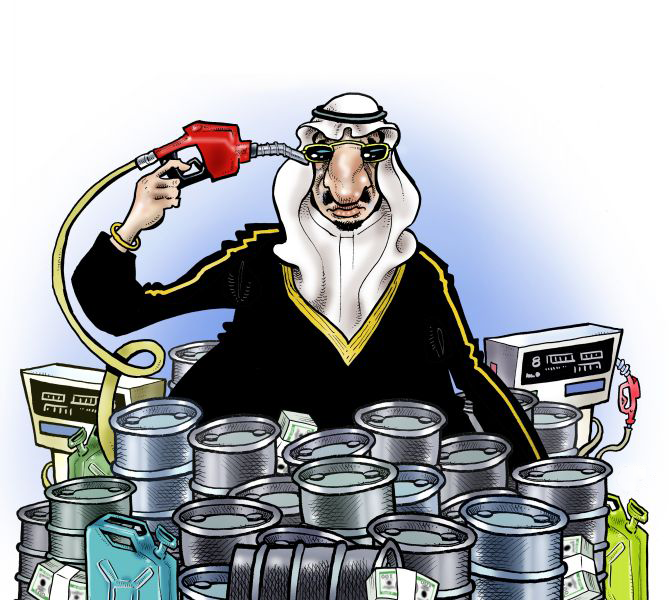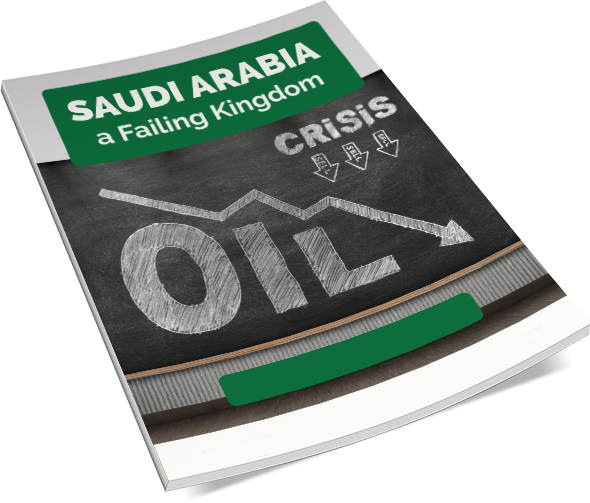



 Yusuf Dhia-Allah
Yusuf Dhia-AllahPoverty and Saudi Arabia may appear a contradiction in terms yet the kingdom’s economy has suffered massive blows because of wrong-headed policies. The kingdom is on the verge of bankruptcy.
The Saudi economy has tanked. Dependent almost entirely on oil and Hajj revenues, low oil prices have deeply hurt the Saudi economy. Add to that the cost of war on Yemen without purpose or end, the regime’s revenues have fallen and reserves depleted. At the rate of $100 billion losses per year, these reserves would evaporate pretty quickly. They are already down by a quarter in the last two years.
These developments would be enough to give pause for reflection and a rethink of policy among rational people but the Saudi rulers are anything but. As the saying goes, when you are in a hole, the first thing to do to get out of it is stop digging. Not the Saudis; they keep digging themselves deeper into the hole largely due to policies formulated by the young inexperienced deputy crown prince, Muhammad bin Salman. In addition to his position as deputy crown prince and with the ambition to become king, he is also defence minister, head of the Kingdom’s economic policy as well as of Aramco, the Saudi oil company. He occupies all these positions due to “one vote” — that of his father, King Salman, as the New York Times put it delicately on October 16. The 80-year-old monarch suffers from frequent memory lapses and has left governance effectively in the hands of his brash inexperienced son.
This has naturally aroused much resentment among the other Saudi royals of whom there are an estimated 7,000. Further, most of them are much more experienced than Bin Salman (BS for short) but the latter does not believe in consultation even among the close-knit royals who keep their disagreements a tightly guarded secret. These, however, have seeped into the public domain with some royals voicing serious concerns, as one Saudi prince did last August when the Guardian of London carried his explosive revelations without naming him.
There are other worrying factors as well for Bani Saud. The US Congress on September 28 passed a bill overriding Obama’s veto that allows family members of the victims of 9/11 to sue the Saudi regime for reparations. With Saudi reserves estimated at $750 billion, the bulk invested in the US, these are likely to get tied down in costly court litigations. Even if the families do not get much, high-priced lawyers certainly would and Saudi funds could end up being in limbo for years.

Referred to as the “Justice Against Sponsors of Terrorism Act (JASTA),” the Senate passed by 97-1 the bill that Obama had vetoed a few days earlier when it was sent to him to sign (the bill was first passed by Congress on September 9). Within hours of the Senate vote, the House of Representatives followed suit by voting against the presidential decree by 348 to 77. Only 18 Republicans and 59 Democrats voted not to override Obama’s veto. This was the first time that Congress had overridden a presidential veto during Obama’s tenure. Immediately after the Congressional vote, Obama told CNN that Congress had set a “dangerous precedent” because he argued, “If we eliminate this notion of sovereign immunity, then our men and women in uniform around the world could potentially start seeing ourselves subject to reciprocal loss.”
This was a reference to civilians killed by US drone strikes around the world. Hitherto, the US had claimed “sovereign immunity” from prosecution but perhaps, this would not work any more. Mistake or not, it is now US law and has not only profound implications for Saudi assets but more importantly for their relations with the US as well as their future. The Saudi policy of buying protection appears to have come unhinged but they keep on repeating the same experiment hoping to achieve a different result. In fact, Obama’s statements may have been for public consumption since as recently as April, he said in an interview with Jeffrey Golberg of the Atlantic monthly magazine that the Saudis are “free loaders.” He made clear that this situation had to change. Such news has only added to worries in Riyadh and, perhaps sleepless nights.
In addition to scurrying to find new protectors (Zionist Israel, for instance), the de facto Saudi ruler, Bin Salman, has also embarked on an ambitious economic restructuring program that carries huge risks. There have been drastic cuts in public spending including a halt to construction projects that has resulted in tens of thousands of foreign workers being laid off. Government workers have seen their pay and benefits greatly reduced amid huge increases in fuel, water, and electricity charges as the regime has withdrawn subsidies.
While such drastic changes imposed rapidly have caused problems for Saudi citizens, they have been disastrous for foreign workers, mostly laborers from India and Pakistan. An estimated 39,000 laborers have not been paid for eight months. They cannot even return home because the employers still hold their passports. Many are on the verge of starvation, forcing their embassies to feed them. Some workers have staged protests and set buses on fire in Riyadh — a highly unusual step in the Kingdom but given their desperate situation, they have been forced to resort to such measures to draw attention to their plight.
The Saudi regime has never cared for foreign workers and treats them virtually as slaves. They have no rights and as the plight of the estimated 39,000 workers shows, they can be dismissed in a wink. Dealing with Saudi citizens will prove more problematic. Throughout its existence, the Saudi regime has kept citizens far away from the decision-making process. These weighty matters have been kept in the “capable hands” of the ruling family. In return, the ruling family has provided generous subsidies and perks to people and so far, no taxation. Given the Kingdom’s dire financial straits, this cannot continue any longer. There are rumblings of revolt.
Last April when the withdrawal of subsidies and imposition of tax was first announced, there were immediate calls about “no taxation without representation.” Further, tens of thousands of Saudis have studied abroad and find the regime’s practices archaic and unacceptable. This feeling is now spreading among the rest of the population as well. Adel Hamaizia, vice chairman of the Oxford Gulf and Arabian Peninsula Studies Forum was quoted by the New York Times (October 13) as saying, “Things are likely to get more difficult for the government in terms of managing frustration from the everyday people.”
With Western, mainly American advice, Bin Salman has proposed Vision 2030 (in a copycat move of Malaysia’s Vision 2020 articulated by the former Prime Minister Mahathir Muhammad). Huge billboards now dominate the skyline in major cities, especially Riyadh where the aged and ailing King Salman, flanked by Crown Prince Muhammad bin Nayef and Deputy Crown Prince Bin Salman are shown staring into the sky. If only such depictions could be translated into reality that is much more difficult to realize than the romantic notions of billboards, life would be a lot easier.

How realistic is this notion of transforming the economy and weaning it away from oil? In the 1970s, the regime launched numerous agricultural projects to transform the desert into farmland. Billions of dollars were spent on expensive desalination plants to irrigate the desert. While some progress was made in terms of producing grain, the cost has been prohibitively high. Such agricultural farms have long bitten the dust. Dairy farming was another hair-brained idea that is likely to similarly become the victim of falling oil prices and, therefore, revenues. The most ludicrous project has been Snow City in the heart of Riyadh where children come to play. Why do desert dwellers need to have a Snow City and is it necessary to emulate whatever the West does where snow falls naturally for several months of the year?
Falling oil prices are the direct result of Saudi overproduction by flooding the market. The idea was to hurt Islamic Iran whom the Saudis view as a nemesis. Their public posture was that they wanted to eliminate the more expensive extraction by fracking that US companies had started developing. While some fracking companies were driven out of business, non-OPEC oil producers such as Russia and America have added their share to the market thereby depressing oil prices further. Overproduction has hurt Saudi Arabia more than Iran. Not surprisingly, in September, the Saudis were forced to agree to a production cut at the OPEC meeting in Algiers.
Will such measures stabilize the Saudi economy? The regime has been forced to take loans from foreign banks and will try to borrow more from the global bond market. Financial experts believe that the Saudi riyal is overvalued and the Saudi central bank will be forced to devalue the currency. Zach Schreiber, head of PointState Capital told investors in May that the Saudi riyal was “massively overvalued” and that the country had only “two to three years of runway before it hits a wall.”
Like most Muslim countries, Saudi Arabia is also faced with an exploding population that has nearly doubled since 1990. And half of all Saudis today are younger than 25. With the private sector not providing many job opportunities — they are not allowed by the army of Saudi royals that control virtually every sector of the economy — the regime has been the biggest employer. Now that revenues have fallen and there are job attritions, how will the 300,000 people entering the workforce each year be accommodated? If one were in Bin Salman’s shoes, these would feel very uncomfortable indeed these days.
Bin Salman’s sycophants never tire of telling people that the young prince works extremely hard, often putting in 16 hours a day. Perhaps, but what is the net result? It might be far more productive if he were to work smart rather than hard, but that may be asking too much from a person whose only entitlement to these important positions is that he happens to be the favorite son of the king.
